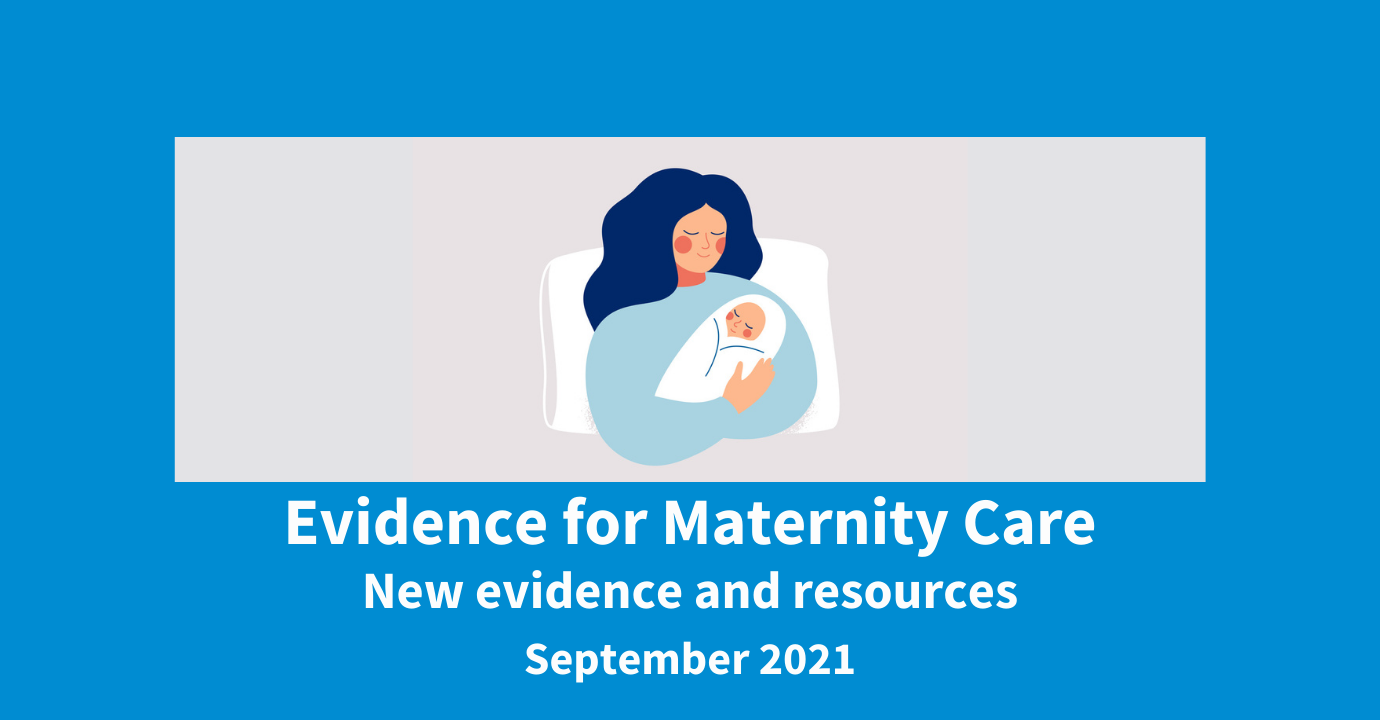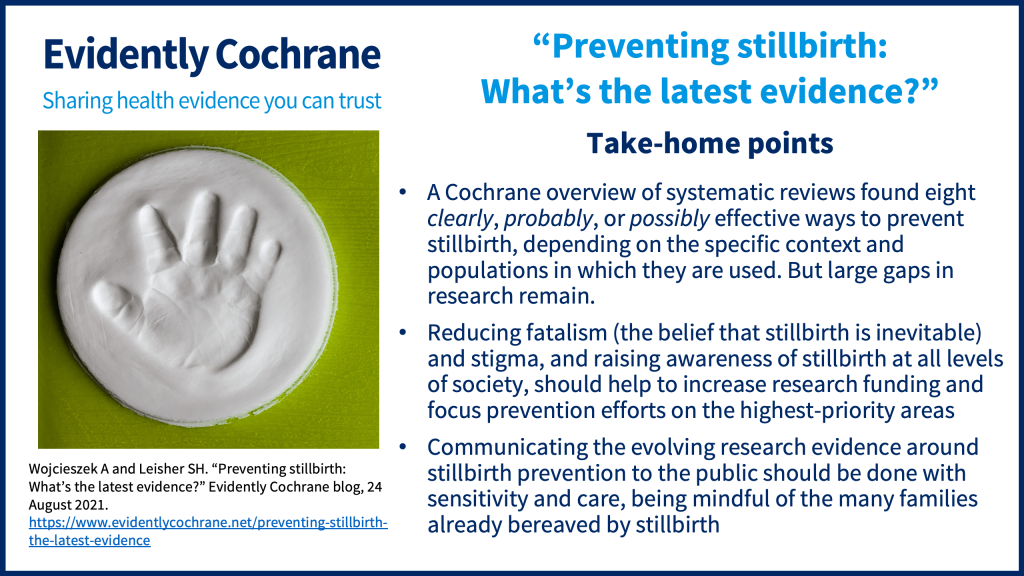The latest evidence and resources for midwives and clinical support staff. You can either scroll through this page or click on any of the links below to jump to the relevant section.
Please note, unlike the rest of our blogs, our ‘Evidence for Maternity Care: new evidence and resources’ blogs will not be updated.
Helping you keep up-to-date with evidence
We are now changing these blogs from quarterly to every two months, bringing you new evidence more quickly, and now giving you the bottom line of the Cochrane Reviews we include. You can still give your feedback on our content – how can we make it more useful for you?
- WHO recommendations supported by Cochrane evidence
- COVID-19
- Antenatal care
- Postnatal care and care of the newborn, including preterm infants
- Opportunities and events
Four new WHO recommendations supported by Cochrane Pregnancy and Childbirth reviews and ‘living guideline’ approach
Four new WHO recommendations supported by Cochrane Pregnancy and Childbirth reviews and ‘living guideline’ approach
The WHO and Cochrane have worked together on a ‘living guideline’ approach, which uses a combination of ongoing literature surveillance to inform prioritization, rapid appraisal of the potential impacts of new evidence on recommendations and accelerated updating of high-priority Cochrane systematic reviews for key questions. The four new WHO recommendations, which relate to the prevention and treatment of maternal peripartum infections, were developed using this approach. You can read more about this in this news item.
COVID-19
This year, Cochrane is continuing to produce new and updated reviews in response to the pandemic. We have blogged about many of them and this blog COVID-19 evidence: a Cochrane round-up brings together a large collection of evidence and resources, starting from when this evidence was first being produced in spring 2020. Like the reviews themselves, all our blogs are updated to reflect new evidence.
Cochrane Special Collections
Cochrane Special Collections assemble Cochrane Reviews on important topics for the prevention and treatment of COVID-19. They are developed with experts from our global Cochrane network. They are based on World Health Organization interim guidance, and continuously updated. You can find Coronavirus (COVID-19) Special Collections here.
Cochrane Podcasts
Cochrane COVID-19 Podcasts offer short summaries of Cochrane COVID-19 reviews from the authors themselves. A good way to hear the latest Cochrane evidence in under 5 minutes each.
Cochrane Clinical Answers
Cochrane Clinical Answers (CCAs) provide a readable, digestible, clinically-focused entry point to rigorous research from Cochrane Reviews. They are designed to be actionable and to inform point-of-care decision-making. Each CCA contains a clinical question, a short answer, and data for the outcomes from the Cochrane Review deemed most relevant to practising healthcare professionals. The evidence is displayed in a user-friendly tabulated format that includes narratives, data, and links to graphics.
You can find Cochrane Clinical Answers related to COVID-19 here.
Antenatal care
The National Institute for Health and Care Excellence (NICE) has recently updated its guidance on Antenatal care, informed by Cochrane evidence. You can also read more in this Press Release: NICE publishes final guideline advising on care throughout a woman’s pregnancy.
Induction of labour
Cochrane Clinical Answers:
- How does low‐dose oral misoprostol compare with vaginal misoprostol for induction of labor?
- How does low‐dose oral misoprostol (initially ≤ 50 µg) compare with vaginal dinoprostone or intravenous oxytocin for induction of labor?
Managing miscarriage
Cochrane Clinical Answer: How do methods for managing miscarriage compare?
Preventing gestational diabetes
Cochrane Clinical Answer: What are the effects of probiotics given for prevention of gestational diabetes on pregnancy and childbirth outcomes?
Preventing stillbirth
In a blog Preventing stillbirth: What’s the latest evidence? Dr Aleena Wojcieszek, clinical epidemiologist, science communicator, and honorary research fellow at the Australian Centre of Research Excellence in Stillbirth (Stillbirth CRE), and Ms Susannah Hopkins Leisher, mom to stillborn son Wilder Daniel (13 July 1999), PhD student in epidemiology at Columbia University, and chair of the International Stillbirth Alliance, look at an overview of Cochrane evidence on antenatal interventions to prevent stillbirth and perinatal death.
See also the new Cochrane Special Collection: Stillbirth prevention and respectful bereavement care.
Postnatal care and care of the newborn, including preterm infants
Postnatal care and care of the newborn, including preterm infants
Early postnatal discharge from hospital
Cochrane Clinical Answer: What are the effects of early postnatal discharge from hospital for healthy mothers and term infants?
Home visits in the early postpartum period
A Cochrane Review on Schedules for home visits in the early postpartum period was updated in July 2021. The review authors found that:
- The evidence is very uncertain about the effect of home visits on maternal and neonatal mortality.
- Individualised care as part of a package of home visits probably improves depression scores at four months.
- Increasing the frequency of home visits may improve exclusive breastfeeding rates and infant healthcare utilisation.
- Maternal satisfaction may also be better with home visits compared to hospital check‐ups.
Opioid withdrawal in newborns
The Cochrane Review Opioid treatment for opioid withdrawal in newborn infants was updated in July 2021 with new trials added and conclusions changed.
Patent ductus arteriosus
Cochrane Clinical Answers:
- How does very early (within three days) treatment compare with expectant management of hemodynamically significant patent ductus arteriosus (PDA) in preterm infants?
- How does early (within 7 days) treatment compare with expectant management of hemodynamically significant patent ductus arteriosus (PDA) in preterm infants?
Preventing post-caesarean infection
Cochrane Clinical Answer: How do first‐ and second‐generation cephalosporins compare with penicillins (with or without beta lactamase inhibitors) for preventing post‐cesarean infection?
Tracheal suction at birth
The authors of a Cochrane Review Tracheal suction at birth in non‐vigorous neonates born through meconium‐stained amniotic fluid (June 2021) concluded that “We are uncertain about the effect of tracheal suction on the incidence of meconium aspiration syndrome (MAS) and its complications among non‐vigorous neonates born through meconium‐stained amniotic fluid (MSAF).”
Tube feeding of preterm and low birth weight infants
The authors of a Cochrane Review Push versus gravity for intermittent bolus gavage tube feeding of preterm and low birth weight infants (August 2021) found a single small study with 31 infants and conclude that “we do not have sufficient evidence to determine the effects of intermittent bolus gavage feeding for preterm and low birth weight infants.”
The authors of the Cochrane Review Slow advancement of enteral feed volumes to prevent necrotising enterocolitis in very low birth weight infants (August 2021) found that “advancing enteral feed volumes slowly (daily increments up to 24 mL/kg) compared with faster rates probably does not reduce the risk of necrotising enterocolitis (NEC), death, or feed intolerance in very preterm or very low birth weight infants. Advancing the volume of enteral feeds at a slow rate may slightly increase the risk of invasive infection.”
The authors of the Cochrane Review Short versus long feeding interval for bolus feedings in very preterm infants (August 2021) conclude that “The low‐certainty evidence we found in this review suggests that there may be no clinically important differences between two‐ and three‐hourly feeding intervals. There is insufficient information about potential feeding complications and in particular necrotising enterocolitis (NEC). No studies have looked at the effect of other feeding intervals and there is no long‐term data on neurodevelopment or growth.”
Opportunities and events
On this page, Important Cochrane Links, you can find opportunities to get involved, including how to join Cochrane, find volunteer tasks, or jump into the Cochrane Library.
This year World Evidence-Based Healthcare (EBHC) Day will be on October 20. Cochrane and six other leaders in evidence-based healthcare put the spotlight on the global impact of evidence on healthcare research, policy, practice and health outcomes. Read here about the Launch of World Evidence-Based Healthcare Day 2021: the role of evidence in an infodemic.
Please note that this page includes a round-up of materials mainly published within the last two months, and is not updated after it’s posted.
Join in the conversation on Twitter with @SarahChapman30 and @CochraneUK or leave a comment on the blog.
Please note, we cannot give medical advice and do not publish comments that link to individual pages requesting donations or to commercial sites, or appear to endorse commercial products. We welcome diverse views and encourage discussion but we ask that comments are respectful and reserve the right to not publish any we consider offensive. Cochrane UK does not fact check – or endorse – readers’ comments, including any treatments mentioned.
Sarah and Selena have nothing to disclose.



